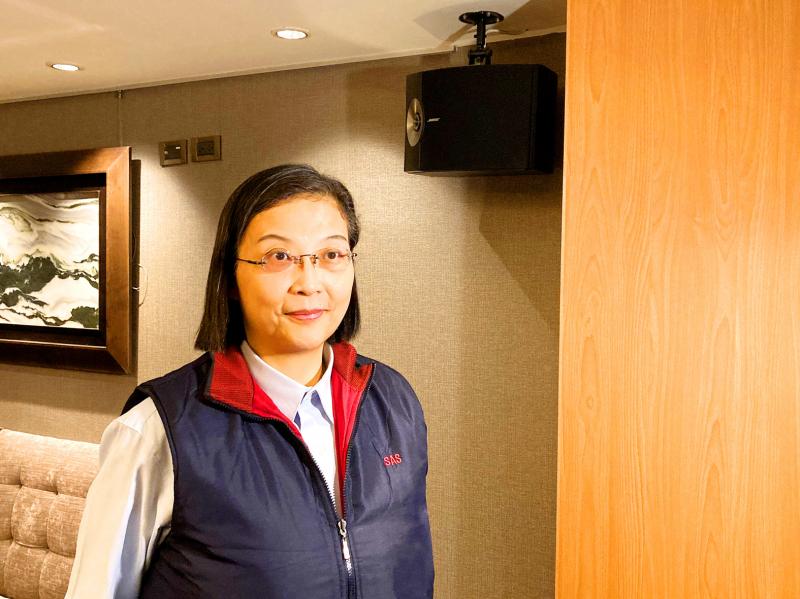GlobalWafers Co (環球晶圓), the world’s No. 3 silicon wafer supplier, on Monday said that it is to raise its prices next year as 5G-related applications and the stay-at-home economy have boosted semiconductor demand during the COVID-19 pandemic, leading to supply constraints.
With limited new supply worldwide, demand is expected to rise to the peak hit in 2018, the Hsinchu-based company said.
GlobalWafers expects to produce an additional 170,000 wafers a month next year as its new 12-inch fab in South Korea is increasing production.

Photo: Lisa Wang, Taipei Times
“We expect the new South Korea fab to reach full capacity next year. We fear we will not be able to supply as many [wafers] as customers have requested,” chairwoman Doris Hsu (徐秀蘭) told reporters at a media gathering in Taipei.
All of the company’s production lines are approaching full capacity and will remain so in the first half of next year, she said.
GlobalWafers is to raise the prices of all its wafers, with 12-inch wafers seeing the highest increases, she added.
The price increases would help hold the average selling price steady next year as some long-term contracts expire, Hsu said, adding that the multi-year contracts usually carry a higher average selling price.
The company is also increasing prices to help absorb volatility on the foreign exchange market, she said, as a strong New Taiwan dollar has eroded profits so far this year.
GlobalWafers expects strong demand to bring its annual revenue next year close to 2018’s record high of NT$59.06 billion (US$2.07 billion).
That forecast does not factor in the acquisition of Siltronic AG. The deal is expected to add NT$45 billion per year to revenue upon completion of the transaction in the second half of next year at the earliest.
“This year is quite a good year for us. As we estimated earlier this year, [revenue] has grown each quarter on a quarterly basis,” Hsu said. “Next year will be better than this year.”
Revenue growth should be expected in each quarter next year, she said.
The pandemic has increased demand for networking equipment, remote education, videoconferencing and online gaming, as well as 5G-enabled smartphones, Hsu said, adding that a global move online has accelerated because of the pandemic.
Accelerating uptake of 5G technology for autonomous vehicles and other devices would make “2022 an even better year,” Hsu said.

MULTIFACETED: A task force has analyzed possible scenarios and created responses to assist domestic industries in dealing with US tariffs, the economics minister said The Executive Yuan is tomorrow to announce countermeasures to US President Donald Trump’s planned reciprocal tariffs, although the details of the plan would not be made public until Monday next week, Minister of Economic Affairs J.W. Kuo (郭智輝) said yesterday. The Cabinet established an economic and trade task force in November last year to deal with US trade and tariff related issues, Kuo told reporters outside the legislature in Taipei. The task force has been analyzing and evaluating all kinds of scenarios to identify suitable responses and determine how best to assist domestic industries in managing the effects of Trump’s tariffs, he

TIGHT-LIPPED: UMC said it had no merger plans at the moment, after Nikkei Asia reported that the firm and GlobalFoundries were considering restarting merger talks United Microelectronics Corp (UMC, 聯電), the world’s No. 4 contract chipmaker, yesterday launched a new US$5 billion 12-inch chip factory in Singapore as part of its latest effort to diversify its manufacturing footprint amid growing geopolitical risks. The new factory, adjacent to UMC’s existing Singapore fab in the Pasir Res Wafer Fab Park, is scheduled to enter volume production next year, utilizing mature 22-nanometer and 28-nanometer process technologies, UMC said in a statement. The company plans to invest US$5 billion during the first phase of the new fab, which would have an installed capacity of 30,000 12-inch wafers per month, it said. The

Taiwan’s official purchasing managers’ index (PMI) last month rose 0.2 percentage points to 54.2, in a second consecutive month of expansion, thanks to front-loading demand intended to avoid potential US tariff hikes, the Chung-Hua Institution for Economic Research (CIER, 中華經濟研究院) said yesterday. While short-term demand appeared robust, uncertainties rose due to US President Donald Trump’s unpredictable trade policy, CIER president Lien Hsien-ming (連賢明) told a news conference in Taipei. Taiwan’s economy this year would be characterized by high-level fluctuations and the volatility would be wilder than most expect, Lien said Demand for electronics, particularly semiconductors, continues to benefit from US technology giants’ effort

‘SWASTICAR’: Tesla CEO Elon Musk’s close association with Donald Trump has prompted opponents to brand him a ‘Nazi’ and resulted in a dramatic drop in sales Demonstrators descended on Tesla Inc dealerships across the US, and in Europe and Canada on Saturday to protest company chief Elon Musk, who has amassed extraordinary power as a top adviser to US President Donald Trump. Waving signs with messages such as “Musk is stealing our money” and “Reclaim our country,” the protests largely took place peacefully following fiery episodes of vandalism on Tesla vehicles, dealerships and other facilities in recent weeks that US officials have denounced as terrorism. Hundreds rallied on Saturday outside the Tesla dealership in Manhattan. Some blasted Musk, the world’s richest man, while others demanded the shuttering of his